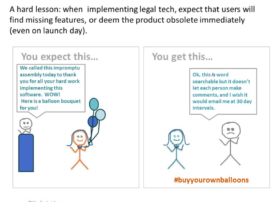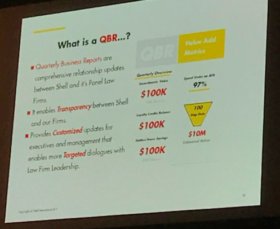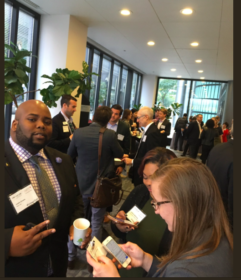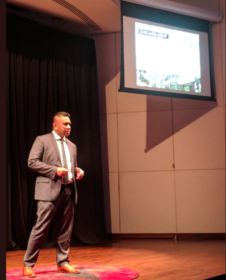Three pitches in one day! In what may be an unusual day at law school for most, I was challenged three times to construct a business pitch in under thirty minutes. Twice, myself and two other law students were tasked with coming up with a solution to a real problem, under time pressure, that we pitched to our class peers in sixty seconds.
First, in my professional responsibility course, Lawyer Ethics and Regulation in a Technology-Driven World, while discussing substance abuse in the legal profession, Professor Dan Linna challenged the class to create a solution to curb addition in the legal profession, starting in law school.
Starting with five minutes of silent brainstorming, followed by a discussion using the start-stop continuum method, my group crafted a pitch for how to demystify the stress of law school to applicants before they apply to law schools. Our solution centered around collecting data on students after their first semester experience to give incoming students a more realistic expectation about what it is like to be a law student. Other solutions included themes of independent counselor resources for law students and an emphasis on communal exercise.
Second, in a lunchtime event sponsored by LegalRnD, Jay Mandal, VP Product & Operations at SAP, Stanford CodeX Fellow, CEO & co-founder of Law Pivot and former lead M&A attorney for Apple lead a Startup & Entrepreneurship Workshop for Lawyers. “The number one thing to take away today is not to be afraid of failure.” Law school teaches law students to be risk adverse, but in business this won’t get us very far. After sharing his journey from a law firm, to Apple, to CEO of his own company, Jay challenged a room full of law students to prepare a business pitch for one of five prompts as if we were pitching to venture capitalists. “Be creative. Judge later.” An entrepreneurial mindset means embracing new ideas, rather than shooting them down at the outset by “restraints” we may be quick to point as lawyers.
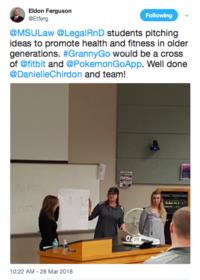 This time my group was tasked with using technology to create a health/fitness solution for the adult population that creates more sustainable exercise and monitoring regimens. With a new team and a stack of sticky notes after thirty minutes we created Grandma Go!
This time my group was tasked with using technology to create a health/fitness solution for the adult population that creates more sustainable exercise and monitoring regimens. With a new team and a stack of sticky notes after thirty minutes we created Grandma Go!


#startups @DanLinna and the @LegalRnD program are teaching law students an entrepre-neurial mindset.
The workshop left the room full of energy, as students praised the opportunity to learn how to develop an entrepreneurial mindset.
Third, Jay visited our Litigation, Data, Theory, and Practice course during which he challenged us to use Amazon’s approach to product development using press releases to pitch the projects we have been working on through-out the semester. Our class is creating innovation projects on Neota Logic and Think Smart platforms with our outside partners Perkins Coie, Davis Wright Tremaine, Akerman, and Michigan Legal Help.
Understanding a business’s perspective and being able to distill an idea down to one sentence, or a sixty second pitch, are not normal skills taught in law schools today, but they are critical to a student’s success as a lawyer.
As I prepare to pitch live for 2018 LWOWX (LawWithOutWalls) symposium next week, I will incorporate my experience from today!

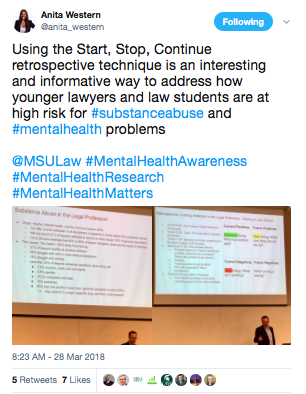

 Who is your A Team? The ability of lawyers to collaborate with professionals of other disciplines was an additional take-away from from this tip. You want professionals with diverse thought and complimentary skills that you can see yourself working with in the future.
Who is your A Team? The ability of lawyers to collaborate with professionals of other disciplines was an additional take-away from from this tip. You want professionals with diverse thought and complimentary skills that you can see yourself working with in the future.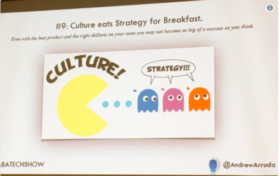
 @bryangwilson
@bryangwilson